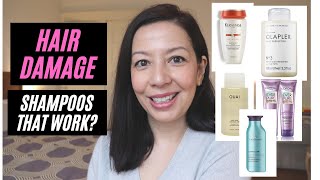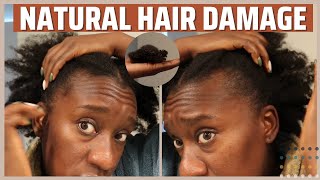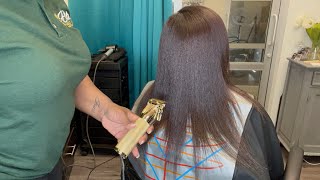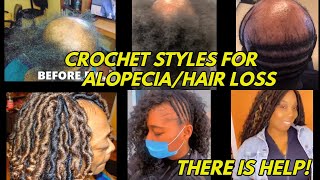Managing heat damaged or relaxer damaged hair
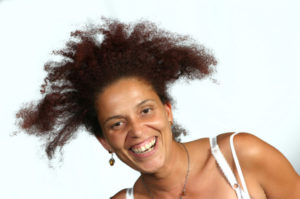 Find out how to deal with damage to the hair to nurse it back to health
Find out how to deal with damage to the hair to nurse it back to health
Some would say that relaxed hair is damaged hair. This is not the case, relaxed hair has been chemically altered so cannot be treated the same way that natural hair is.
It is easy to tell the difference between healthy and damaged relaxed hair. The damaged hair will be dry to the touch and extremely fragile. It will fail an elasticity test miserably, snapping with little force whether wet or dry. Damaged hair will also look dull with a reddish tint rather than natural black colour. The hair ends also tend to be frizzy with a multitude of split ends.
Heat damaged natural hair, although stronger than the relaxed damaged hair; it will still be weaker than its healthy counterpart. The easiest way to tell that hair has been heat damaged is that the curls do not return or look loosened and uneven when the hair is wetted. This will usually happen on the ends of the hair as this is the oldest and therefore the weakest part of the hair. The hair will also have many split ends.
There is no quick fix solution to damaged hair. If the damage is minor then regular treatment will restore the hair to health. However, with major damage like split ends or excessive heat damage, only scissors will do the trick! Of course not everyone is willing to chop all their hair off and start again so there are a few solutions to manage the damaged hair and keep it on the head long enough for new healthy hair to grow in. With regular trims you can get rid of the damaged hair slowly while keeping the hair at a length you are comfortable with.
Minor damage solutions:
• Dry hair – Most relaxed hair that is damaged will fall into the dry hair category. A series of deep conditioning* and porosity control treatments twice per week for 4 weeks should restore the hair’s moisture levels to normal. The deep conditioner* required should contain hydrolyzed proteins which will not only be strong enough to impart strength to the hair; they will also be small enough to penetrate the innermost layers of the hair. For the upkeep of relaxed hair or natural curly and kinky* hair, deep conditioning* should be done once per week.
• Hair that is mushy when wet – This signals hair that has too much moisture and not enough protein. – A strong protein treatment should restore health to hair in as little as 1 application.
• Minor heat damage – The curls at the ends of the hair are not as defined and appear looser. To correct this, all direct heat to the hair must be avoided for as much as 2 months. In this time a series of protein deep conditioners (not a strong protein treatment) must be applied once per week to re-strengthen the hair. If the damage is minor the curls should return to normal. Minor heat damage also produces split ends. Cut these off individually as you see them and make sure to keep the ends moisturized twice daily.
Major damage control
As mentioned before, only cutting the hair will solve major damage issues. Major damage involves:
• Hair that is very weak from over processing from bleaching the hair repeatedly to change the hair colour
• Misuse of relaxers – Overlapping relaxers or leaving the chemical in the hair too long
• Failing to neutralize relaxers – Using a regular shampoo to rinse relaxer instead of a neutralizing shampoo may cause major damage as the chemical may continue to weaken the hair even after it has been rinsed.
• Misuse of heat tools – Natural hair that has been ‘burnt’ straight from the misuse of heat tools and relaxed hair that has been pressed with too much heat.
To control the above until you are ready to trim the damaged hair you will need:
1. A strong protein treatment every 6 weeks to impart strength to the hair and curb the breakage. Try Aphogee two step protein treatment* or Nexxus Emergencee.
2. Weekly deep conditioning treatments to keep the hair moisturized.
3. A protein rich diet to ensure that new hair grows healthy.
4. Avoid heat tools and choose heat-free methods to straighten the hair.
5. A reassessment of hair goals – e.g. colour options or necessity of a relaxer for your hair type
6. Regular trims to remove the damaged hair
The use of a gloss hair product can be used to give the hair the appearance of health while you are waiting for your hair to grow. Please note that the silicones in these products (dimethicone, cyclomethicone) will only give the hair the appearance of health. The hair will still be damaged and will therefore need to be trimmed. See the article on the hair trimming myth.
Tips to avoid further damage:
1. Keep up with deep conditioning and protein treatments to avoid dry, weak hair.
2. Avoid using heat tools where possible. There are other healthier options of styling hair!
3. If heat is used, use a temperature controlled tool (never stove heated ones) and use heat protectant* on the hair beforehand.
4. Always make sure that the hair is freshly deep conditioned if heat is to be used.
5. Clarify hair after swimming to remove chlorine residue.
6. Let the hair air dry where possible or blow dry on a cool setting.
7. Use no-ammonia hair colours.
8. Wait until you have enough growth before relaxing the hair to avoid overlapping. 2-3 months should give 1-1.5 inches of hair.

